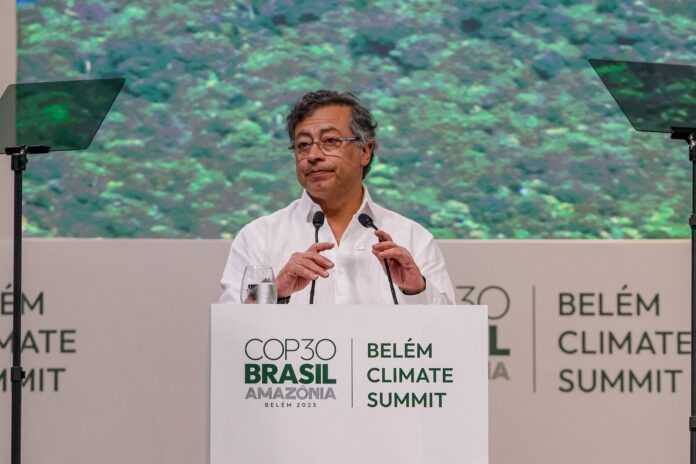
At the close of the COP30 climate summit, held in Belém (Brazil), Colombian President Gustavo Petro delivered a forceful gesture: he publicly rejected the final declaration for omitting any mention of fossil fuels.
In his message, he said he could not accept a text that does not acknowledge, with the clarity demanded by science, that the main cause of the climate crisis is oil, coal, and natural gas. For Petro, any environmental agreement that fails to state that scientific truth is simply hypocrisy.
In this regard, last Friday Colombian Environment Minister Irene Vélez had already announced at the Brazilian forum the convening of a summit for the elimination of fossil fuels, a meeting that is to be held in the city of Santa Marta next April.
Colombia’s Petro rejects COP30 Declaration for omission of fossil fuels
The core of his criticism is based on the conviction that fossil fuels are “the cause of the climate crisis” and that avoiding naming them explicitly in the COP30 final document is equivalent to denying what has already been demonstrated by the most rigorous studies. Petro stressed that life on the planet—including human life—is only viable if the world separates itself from those energy sources, as determined by science. In his view, the omission is not a mere diplomatic oversight; it is a betrayal of scientific truth.
“I do not accept that the COP30 declaration does not clearly state, as science says, that the cause of the climate crisis is the fossil fuels used by capital. If that is not said, everything else is hypocrisy,” the Colombian president wrote yesterday on his X social media account.
Petro added that “life on the planet, including ours, is only possible if we break away from oil, coal, and natural gas as energy sources; science has determined this, and I do not blind myself to science,” and concluded his message with a blunt statement: “Colombia opposes a COP30 declaration that does not tell the scientific truth to the world.”
No puedo contradecir la ciencia, ni como hombre de izquierda ni como hombre de razón, ni como heredero de la libertad que nos dejó el pueblo Grancolombiano y su conductor: Bolívar.
Soy presidente de Colombia y dije que Colombia sería potencia mundial de la vida, y once millones…
— Gustavo Petro (@petrogustavo) November 22, 2025
What happened in Belém was neither accidental nor isolated. More than 80 countries, including Colombia and several members of the European Union, had demanded a concrete roadmap to move toward the progressive phaseout of fossil fuels. However, those efforts ran up against resistance from major oil- and gas-producing powers, according to international media reports.
In the end, the Brazilian presidency opted for a compromise agreement: it created a parallel plan—outside the formal text—to develop a roadmap toward phasing out fossil fuels, as well as another to curb deforestation. But for Petro, that is not enough because, according to him, this plan does not carry the same political and symbolic weight as an explicit acknowledgment in the COP declaration.
Diplomatic tensions flare over a COP30 agreement that fails to convince
Colombia’s response went beyond rhetoric. During the final plenary, its delegate denounced a procedural error that prevented formally submitting the objection; the COP president, André Correa do Lago, acknowledged the complaint, explaining what happened as human error caused by fatigue after hours of negotiation. Despite the diplomatic murmurs, the text was sealed and Colombia made it clear it is not aligned with that version of the global consensus.
Interim Environment Minister Irene Vélez backed Petro’s position and warned that there will be no “moral veto” capable of stopping the government’s vision for a just and effective transition. For his administration, the commitment to life allows for no ideological or diplomatic ambiguity.
Environmental organizations have questioned the strength of the pact. Some have described it as an “empty agreement” due to the absence of concrete references to the progressive elimination of hydrocarbons. Critics argue that the honeymoon of multilateralism ended with a text reduced to vague promises and parallel processes, without strong legal commitments.
In response to the omission, Brazil committed to promoting a long-term initiative: two roadmaps during its presidency, one dedicated to the energy transition and another to deforestation. Petro, for his part, has made clear that he will not give up insisting that science be at the center of climate commitments.
The clash of positions, however, exposes the failure of COP30 and demonstrates the planet’s inability to agree on a roadmap to effectively fight climate change.
While some celebrate the agreement as “better than nothing,” the Colombian president delivers a warning: without naming the root of the problem—fossil fuels—the pact falls short and will remain, for many, yet another empty declaration showing humanity’s inability to avoid what it keeps insisting it wants to avoid.

See all the latest news from Colombia and the world at ColombiaOne.com. Contact our newsroom to report an update or send your story, photos and videos. Follow Colombia One on Google News, Facebook, Instagram, TikTok and subscribe here to our newsletter.


